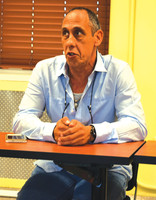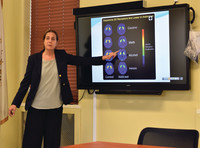Michael Manfredi shouldn't have been addressing the crowd at the Department of Corrections on Monday afternoon. Manfredi, 55, had done drugs for nearly 35 years. He decided to share his story at a workshop discussing the success and
This item is available in full to subscribers.
We have recently launched a new and improved website. To continue reading, you will need to either log into your subscriber account, or purchase a new subscription.
If you are a current print subscriber, you can set up a free website account by clicking here.
Otherwise, click here to view your options for subscribing.
Please log in to continue |
|



Michael Manfredi shouldn’t have been addressing the crowd at the Department of Corrections on Monday afternoon.
Manfredi, 55, had done drugs for nearly 35 years. He decided to share his story at a workshop discussing the success and future of medication-assisted treatment (MAT), which helps inmates recover from opioid addiction.
Manfredi knows he was a success story, and also predicted what would have happened if he didn’t choose to receive his first Vivitrol shot in April 2013.
“I was locked up 2012, I was 50 years old, do I want to stop doing what I’m doing or just do my time and get back to streets,” Manfredi said. “I’ve been clean almost six years now. I had to do something to help me live a good life. If I didn’t get on maintenance when I left, I’d be dead.”
He receives a shot of Vivitrol once a month, a drug that acts as an opiate blocker according to Dr. Jennifer Clarke. Dr. Clarke said Vivitrol inhibits a user from getting high, and it’s been Manfredi’s preferred form of MAT.
His treatment doesn’t stop with a monthly shot at the Providence Center, though. He has to see a psychiatrist, social worker and case manager on a schedule as well. He also keeps in touch with those he meets at Narcotics Anonymous meetings and others whom he meets in detox.
“Can’t keep it unless you give it away,” Manfredi said, alluding to his desire to help others kick addiction.
He finds euphoria in a different outlet now: his grandkids. He resides with his daughter and her children in Providence, and he called his treatment a “lifesaver.”
“My ultimate high,” Manfredi said of his grandchildren. “I shouldn’t be sitting her today. Somebody has a purpose for me today. There was no maintenance back in my day. I’m happy it’s being implemented for the system today.”
Some of Manfredi’s friends haven’t been as fortunate. Rhode Island has been no exception to the opioid epidemic, as DOC Director A.T. Wall noted that the state has seen more than 1,200 opioid-related deaths over the past couple years.
The lacing of heroin with fentanyl has seen deaths skyrocket across the country, and it’s hit home for Manfredi.
“I’ve probably lost about 50 friends in the last five or six years,” Manfredi said. “Everything is coming through with fentanyl. It’s a death sentence. It’s an epidemic. I’ve been out there a long time and you never needed to worry about dying. You don’t know what you’re getting [anymore].”
Rhode Island is the first state to provide all three approved drugs for their MAT programs. Outside of Vivitrol, Manfredi’s sworn method, there is Methadone and Suboxone. The former, according to Dr. Clarke, allows opioid addicts to function better in society while reducing the impulse to use.
Suboxone has a similar effect in that it helps with withdrawal, but it has a “ceiling effect, so it only lets so many of the opiate receptors open in the brain.” She said overdose from Suboxone is rare.
“It’s not just the humane thing to do, but it’s really going to save lives,” Dr. Clarke said.
When Gov. Gina Raimondo established her Opioid Task Force in August 2015, fewer than 40 inmates per day were being treated. Also in that same time frame, only 26 out of 3,100 inmates were receiving the correct amount of therapy to counter their disease.
Becky Boss, director of the Department of Behavioral Healthcare, Developmental Disabilities and Hospitals and co-chair of the task force, noted that all three forms of treatment do have one trait in common.
“This is one of the few diseases where the treatment can be as stigmatized as the disease itself,” Boss said. “It’s important to know that effective treatment can take many different paths. Not any one of those paths is guaranteed to prevent relapse.”
Manfredi isn’t headed down the relapse path, though. He has seen the drug-free life and never wants to go back.
“You have to hit a bottom, if you don’t hit bottom you’ll never stop,” Manfredi said. “I don’t have the urge or cravings. I don’t think about drugs.”
Comments
No comments on this item Please log in to comment by clicking here